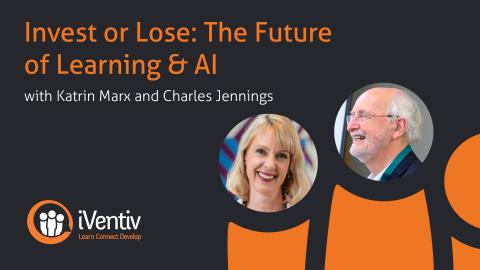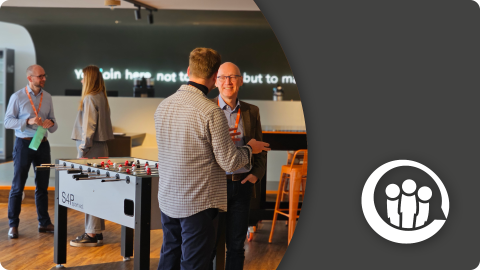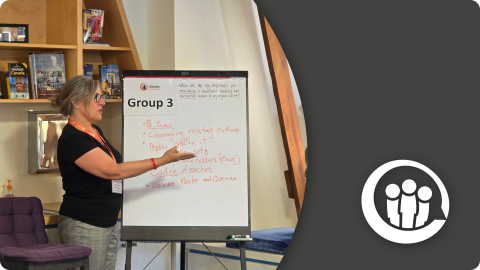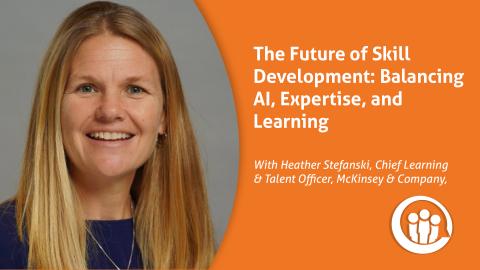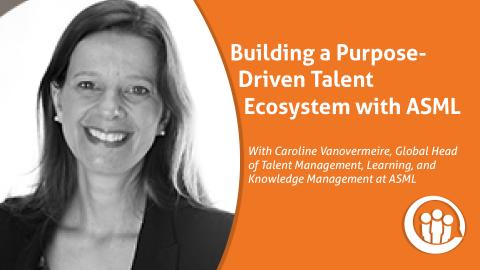In today's rapidly evolving tech landscape, companies like Expedia and Microsoft are harnessing the power of new technologies to drive Learning, Talent, and business objectives. Leveraging AI, including generative AI and tools like Microsoft's Copilot, these companies personalise learning experiences, enhance performance management, and streamline operations.
To learn more, iVentiv’s Hannah Hoey caught up with Liz Moran (VP of Global Talent Management, Expedia), Manasi Joshi (Senior Director, Learning & Development, Expedia), and Brian Murphy (Senior Director, Employee Skilling, Microsoft), to talk about new and emerging tech, transformation, and the power of learning and talent partnerships. Liz, Manasi, and Brian will all be part of the conversation at Learning Futures Seattle in August 2024 and this was an ideal chance to start the conversations.
Watch the full interview to learn how new tech is transforming corporate learning, improving operational efficiency, and supporting Talent Management to meet business objectives.
How do you use new technologies to achieve learning, talent, and business objectives?
Manasi, Liz, and Brian discussed how leading tech companies like Expedia and Microsoft use new technologies to achieve Learning, Talent, and business objectives by highlighting the constant disruption and rapid pace of the tech industry which, they said, requires continuous adaptation and learning.
Manasi Joshi emphasised leveraging generative AI to personalise learning experiences, provide real-time coaching, and streamline operations, enhancing both learning teams and individual learners. AI, she said, helps in quickly adapting learning plans and recommendations, which is crucial in a fast-evolving industry.
Liz focused on using AI, specifically Microsoft's Copilot, to enhance performance management by providing clear, personalised feedback for employees, supporting managers in delivering impactful and individualised performance reviews.
Brian added that AI's potential for personalided learning, as demonstrated by tools like ChatGPT-4o, can revolutionise corporate L&D functions. He stressed the importance of embracing AI not only for internal use but also for skilling employees on AI tools and systems. This approach, he said, ensures tech companies remain competitive and efficient in developing expertise rapidly.
How do you develop expertise quickly and efficiently in line with rapid change in the tech industry?
To answer this question, Brian highlighted the relentless need for speed and the limitations of traditional learning approaches, emphasising the transformative potential of tools like Microsoft's Copilot. He stressed the importance of adopting a new orientation around using AI, not just for learning new skills but also for developing new ways of working.
Liz and Brian both underscored the role of communities of practice and experiential learning. These approaches, they said, bring together experts at the forefront of technological change to collaborate and learn in real-time. They facilitate the rapid dissemination of knowledge and skills across the organisation, enhancing agility and responsiveness to technological disruptions.
Manasi added that balancing depth and breadth in learning is essential. Introducing basic principles to a wide audience while developing deeper, specialised knowledge for specific roles, she said, ensures comprehensive understanding and application of new technologies. This layered approach, she went on to highlight, helps in scaling expertise across the organisation.
The discussion also highlighted the importance of social learning and harnessing collective knowledge within the organisation. Building networks and supporting connections among employees, the interviewees agree, allows for the exchange of tacit knowledge, which may not yet be documented but is vital for staying ahead in a rapidly evolving industry.
How do you make Talent and Learning teams work together?
To effectively make Talent and Learning teams work together, Liz and Manasi emphasised the importance of integrated strategies and collaboration within an organisation. They discussed several key approaches:
1. Strategic Workforce Planning
Liz highlights that strategic workforce planning is crucial because it helps identify the skills needed, succession planning, and pipelines. This information allows the Learning strategy to support and build necessary skills, ensuring both individual and organisational growth.
2. Integrated Strategies
Talent and Learning strategies should not operate in silos, they said, but instead should work hand-in-hand. This means aligning their goals and creating joint roadmaps that reflect a unified approach to achieving organisational success.
3. Driving Culture
Talent and Learning teams play a significant role in shaping and supporting the organisational culture. When these teams collaborate effectively, they can drive a cohesive and supportive culture that aligns with the organisation’s aspirations, benefiting all employees.
4. Communities of Practice
Both Liz and Manasi highlighted the value of functional communities – communities that facilitate the exchange of expertise and networking across the organisation. By developing talent through these communities, they ensure that learning and skills development are interconnected, promoting continuous growth and improvement.
5. Focus on Skills
Brian added that skills act as a unifier, tying together organisational growth and individual career development. By focusing on developing the right skills, Talent and Learning can break down traditional silos and work more cohesively.
How will leaders of the future need to operate in the world of AI?
According to Liz, Manasi, and Brian, leaders will need to operate in the world of AI by combining traditional leadership qualities with adaptability, emotional intelligence, and curiosity.
As AI becomes integral to the workplace, leaders, they said, must embrace change, remain flexible, and continuously adapt. They should rethink work design, breaking tasks down to leverage AI effectively, and ensure that their training programs anticipate future needs rather than focusing on the current state of things.
Emotional intelligence, they emphasised, will also be crucial, especially in recognising biases, protecting privacy, and fostering an inclusive environment. Leaders, it was said, need to balance AI's capabilities with human-centric leadership to make ethical and empathetic decisions.
Curiosity was another critical trait talked about. Leaders should ask good questions, remain open to new ideas, and continuously seek knowledge to understand the root causes of issues and drive innovation – a mindset that they mentioned helps avoid missed opportunities and enables leaders to take their organisations to new heights through informed decision-making and clear guidance.
Brain also told us that leaders must lead with purpose and align their actions with organisational values, especially as younger generations entering the workforce place a high value on purpose-driven work. This alignment will help engage and motivate employees, ensuring a cohesive and supportive culture.
As technology evolves, say the group, so too must Leadership, with a focus on embracing curiosity, leveraging emotional intelligence, and maintaining a clear, purpose-driven approach to navigate the challenges and opportunities that AI presents.
How do you know the transformative tech from the fads? What is the VHS of tech ‘powered by AI’?
In discerning between transformative tech and fads in the AI-driven landscape, the key, the group say, lies in evaluating the technology’s practical impact and longevity.
Brian highlighted that truly transformative tech, such as AI copilots, will revolutionise how we work by providing personalised and immediate support, enabling people to access what they need when they need it. This capability, he underscored, allows AI to become integral, enhancing user experiences and productivity, while technologies lacking these core benefits will fade quickly.
Liz, on the other hand, suggested looking to the past to predict future trends, emphasising the importance of understanding how users engage with new technologies. The feedback from users and their ongoing interaction with the technology serves as an indicator of its potential to be transformative. Technologies that prove useful, help users grow, and consistently deliver business outcomes, she said, are more likely to be sustainable and impactful.
Manasi added that what might be a fad for some could be essential for others, pointing out the importance of contextual relevance. For corporate Talent and Learning teams, transformative tech is defined by its ability to prepare the organisation for the future. Monitoring how users pick up and engage with technology provides clues about its longevity and utility. Rapid adoption followed by quick abandonment, she said, signals a fad, while sustained engagement indicates transformative potential.
Frequently Asked Questions
How can leaders ensure ethical and empathetic use of AI in the workplace?
Leaders can ensure ethical and empathetic use of AI by combining emotional intelligence with technological understanding. They must recognise biases, protect privacy, foster an inclusive environment, and balance AI's capabilities with human-centric leadership. Embracing curiosity and purpose-driven actions further aligns AI use with organisational values and employee engagement.
What role do communities of practice play in developing expertise?
Communities of practice facilitate real-time collaboration and knowledge exchange among experts, enhancing agility and responsiveness to technological changes. They support the rapid dissemination of skills and expertise across the organisation, promoting continuous learning and improvement, and helping to scale knowledge and capabilities efficiently.
How can you tell the transformative tech from the fads?
Evaluating a technology’s practical impact and longevity is crucial. Transformative tech, like AI copilots, enhances user experiences and productivity. User feedback and ongoing interaction with technology indicate its potential. Technologies that consistently deliver business outcomes and prepare the organisation for the future are more likely to be sustainable and impactful.
How do you make Talent and Learning work together?
Integrating strategies and collaboration within the organisation is key. This includes strategic workforce planning, aligning Talent and Learning strategies, driving organisational culture, leveraging communities of practice, and focusing on skills development. Practical examples include creating joint roadmaps and functional communities to translate Talent development into learning impact.
How do you develop expertise quickly and efficiently in line with rapid change in the tech industry?
Developing expertise involves leveraging AI for new learning methods, fostering communities of practice for real-time collaboration, balancing depth and breadth in training, and promoting social learning to harness collective knowledge. These approaches ensure agility and responsiveness to technological disruptions, allowing organisations to remain equipped to handle continuous advancements.






